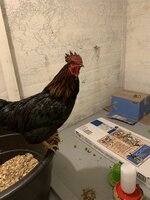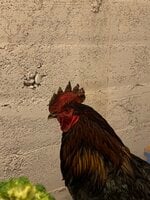Need major advice!
we’ve been battling some severe frostbite on our rooster. We live in Northern MN where every now and then our nights get down to -20 F. the other night it got down to -12F inside our chicken coop and that’s when our rooster got severe frostbite. He has had frostbite since the beginning of winter, just on the tips of his comb and wattle. But now his comb is looking really bad. We have been putting bag balm and a natural tonic (liquid herbs/spices) on it and we finally brought him inside yesterday(he’s been inside for almost 24hrs now). I don’t know how to tell if it’s infected. It was kind of bloody yesterday and that’s why we decided to bring him in. It’s black but not swollen. We just don’t know what to do now and we can’t find a vet that takes care of farm animals.
he is also really hard to catch and handle. He really hates to be touched or held.
we’ve been battling some severe frostbite on our rooster. We live in Northern MN where every now and then our nights get down to -20 F. the other night it got down to -12F inside our chicken coop and that’s when our rooster got severe frostbite. He has had frostbite since the beginning of winter, just on the tips of his comb and wattle. But now his comb is looking really bad. We have been putting bag balm and a natural tonic (liquid herbs/spices) on it and we finally brought him inside yesterday(he’s been inside for almost 24hrs now). I don’t know how to tell if it’s infected. It was kind of bloody yesterday and that’s why we decided to bring him in. It’s black but not swollen. We just don’t know what to do now and we can’t find a vet that takes care of farm animals.
he is also really hard to catch and handle. He really hates to be touched or held.







